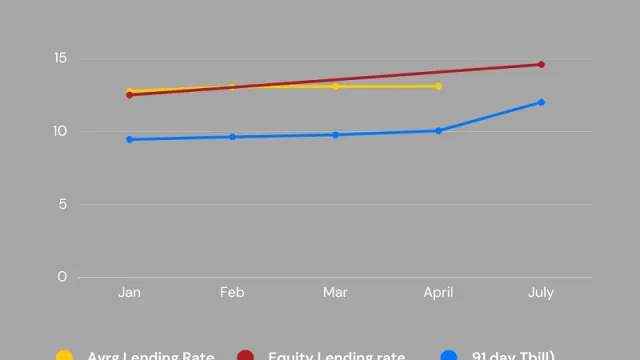Government three-month borrowing rate rises to cost of consumer loans

Government three-month borrowing rate rises to cost of consumer loans
Banks are rushing to increase cost on their loans after the rates at which the government borrows for three months rose to near average consumer loans' lending rates.
Banks and pension funds have increased the rates on risk free government debt from 9.4 in January to 12 percent signaling a rise in borrowing rates for individuals and corporates that stood at 13.1 percent in April.
Equity Bank was the first lender to abruptly increase rates from 12.5 percent to 14.6 percent in January. Borrowers will pay over 20 percent once risk and premiums are factored into the loan price.
A note from NCBA to customers said: "In view of the recent increase in the Kenya Central Bank rate, we wish to advise that we will adjust our Kenya Shilling Base Lending Rate to 13.0% p.a. effective 7th August 2023."
The cost of lending to the government for three months has increased sharply over the last auctions as banks and investors take a very short term view of government prospects indicating they expect the country to undergo some form of recession.
In this week’s auction, the three-month paper received 667.7 percent subscription. In comparison, the six-month bill only received 11 percent interest and the year-long paper received 22 percent subscription.
Although the government only wanted Kes4 billion from the 91-day bill, they accepted the entire Kes26.6 billion offering. The Treasury is keen on meeting part of the Kes39.1 billion rollovers and redemptions that fell due.
Investors are sensing the government's desperation for cash and are demanding a premium. They are packing money on the short run to take advantage of the situation the government finds itself in. The Central Bank has little choice but to increase the cost of domestic debt as the economy and taxes struggle.
The bond market is a great predictor of inflation and the direction of the economy. Kenyan investors are not showing confidence in the long-term prospects of the economy. They are also sceptical of the government’s ability to meet maturing bonds. This scenario has the net effect of piling money on three-months paper while ignoring six and one year Treasury bills.
Read also: World Bank sees Kenya caving on higher cost of living
Oncoming recession
Short term bonds and bill rates are slowly rising above longer-dated government papers. And this is setting the stage for an inverted yield curve that signals oncoming recession.
The fact that the government is borrowing so expensively for just three months means banks would rather give money to the risk free borrower than loan to businesses. This has the consequence of crowding out the private sector and causing the economy to struggle.
The World Bank warned Kenya's government crowding out the private sector as credit is growing more slowly than GDP, highlighting that the banks' role in facilitating investments and economic activity remains challenged.
Banking sector credit to the private sector peaked in 2015. It has, however, been subpar on regulations on interest rates and fiscal expansion. Currently, the government is experiencing difficulties in obtaining loans abroad. This drought is forcing policymakers to increase prices on the local market and restrict loans to the private sector.
Already, the Stanbic Bank Kenya Purchasing Managers' Index (PMI) that tracks private sector activity is registering below the 50.0 neutral mark for the fifth month running, to 47.8 points compared to 49.4 in May.
Although Kenya's economic performance for the three months period to March 31 expanded by 5.3 per cent compared to 6.2 percent same period last year on improved performance in agriculture, nearly all other sectors of the economy declined. Analysts attribute this to a lack of purchasing power in the economy due to high inflation and cash shortages.
Agriculture sector expanded
While agricultural sector grew from 1.7 percent to 5.8 percent thanks to favorable weather, rising inflation hurt other industries. Overall, inflation saw demand for products and services drop. Most sectors dipped slightly from last year including construction whose growth halved. ICT, accommodation and food services, electricity and water storage and transport sectors were also hit.
Rising interest rates and slowing business has seen loan defaults rise to 14.9 percent in May. As a result, banks are aggressively seizing failing businesses. Data shows the number of companies placed under receivership almost double in the six months to June compared to 2022.
Equity Bank has placed the most companies under administration including contested TransCentury. Other firms under Equity's radar are East African Cables, Tuskys, Kigali Business Centre, and Dickways Construction. Also in Equity's bad books are Sumoko Down Town Enterprises and Sea Angel Petrol.
On its part, KCB has seized English Point Marina, and together with Absa Kenya sought to take over Savannah Cement. Regional lender NCBA sought to place Multiple Hauliers under administration. Together with Cooperative Bank, NCBA is pursuing Kaluworks. The lender also wants to take over Royal Swiss bakery in liaison with KCB and First Community banks.
Lenders are also pursuing Hashi energy, Mulleys, Invesco, Explico and Amaco Insurance companies.



